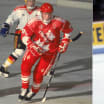The Philadelphia Flyers won't call it a power kill, but they have stepped up their aggression significantly in short-handed situations this season.
Entering their game against the Buffalo Sabres at KeyBank Center on Friday (7 p.m. ET; NHLN, NBCSP, MSG-B, SN1), they are 16th in the NHL on the penalty kill at 77.8 percent and are tied with the Carolina Hurricanes for the League lead with four short-handed goals.
"We'd like to get on the attack if we can," said assistant coach Brad Shaw, who oversees the penalty kill. "Every opportunity, we feel like we can catch their offensive guys leaning the wrong way."
It's an aggressive approach the Flyers feel more comfortable playing this season in part because of the availability of center Sean Couturier (back) and forward Cam Atkinson (neck), each of whom missed last season because of injury.
Couturier averages 1:48 of short-handed ice time per game, which leads Philadelphia forwards, and Atkinson is third at 1:39. Couturier and Atkinson generally are the first forward pair on the ice in a short-handed situation.
"I think Sean Couturier has proven over the years that he's one of the better defensive forwards in his generation," Shaw said. "To be able to have him out there calming things down ... I think we've done a good job at stopping our mistakes at one. So we'll make a mistake and then we sort of regroup ourselves and get back into position or have a real good stick in the next confrontation and create the loose puck that we're looking for. That's really been driven by him.
"Cam, I had in Columbus (with the Blue Jackets) for five years (as an assistant coach) and I really have a comfort level with how he kills. To have those guys out there, and they start a lot of our PKs right now, not only are you winning a lot of face-offs with Couturier, but if you're losing it, that first 10 or 15 or 20 seconds of zone time, there's a little bit more poise or savvy out there than we had last year.
"That's given us a chance to weather the storm a little bit and get on our toes, and when we're down in games get on the attack once in a while."
Atkinson said the aggressive approach the Flyers are using now is similar to how the Blue Jackets played during his time with Shaw and coach John Tortorella in Columbus.
"Aggressive up-ice pressure at all times until they get fully set up," he said. "I think we've shown that and we've gotten a lot of turnovers and clearly goals on it."
That includes three short-handed goals in a 5-4 overtime loss at the Dallas Stars on Oct. 21, the first time a team has done that since the Calgary Flames on Nov. 25, 2018.
Forward Travis Konecny scored two of them, the first coming off a deflected pass by forward Noah Cates as the Stars attempted to enter the offensive zone, which allowed Konecny to break in alone and score.
That's the kind of pressure Philadelphia wants to put on opposing power plays in order to disrupt their rhythm.
"The one thing we always say is we'd way rather make a mistake being aggressive than sitting back on our heels," Konecny said. "At least then you're creating some sort of pressure and that's the hardest thing on the power play, when you have guys skating at you and you have to make a decision. Just want to make guys make decisions."
The offseason signings of center Ryan Poehling and forward Garnet Hathaway have given the Flyers two more experienced penalty killers. Poehling is averaging 0:54 per game on the penalty kill and Hathaway 0:49. They have allowed the Flyers to lighten the penalty-killing load on center Scott Laughton (1:19 per game, down from 2:11), Konecny (0:54, down from 1:51) and forward Joel Farabee (0:17, down from 0:59).
Communication is the key for an aggressive penalty kill to be successful. Atkinson said he tells whatever forward he's killing with that he wants to be the F1, or first forward in on the forecheck, and he trusts that whoever he's with can read off his movements.
Continuity in the forward groupings also is key.
"It's just like a line getting comfortable together, [defense] pairs getting comfortable, I think it's a similar thing with the PK," Konecny said. "I've PK'd with 'Laughts' the most and me and him just have a sense for what the other guy is doing. When I see him pressuring in certain areas I know where I have to be because I know his tendencies and he's the same with me."
Philadelphia has gotten an NHL-high nine short-handed points from seven players, including two goals each from Konecny and defenseman Sean Walker.
They are spending 30.4 percent of their short-handed ice time in the offensive zone, fifth in the NHL, up from 25.7 percent last season.
That number could climb higher as the season progresses.
"I think 'Shawzie' even wants it more than what we do," Laughton said. "We kind of sat back a little bit too much last year and let teams enter our zone. We're trying to kind of kill the clock a little bit more down ice and we're creating stuff. It's been exciting for our group but we need to continue it."


















